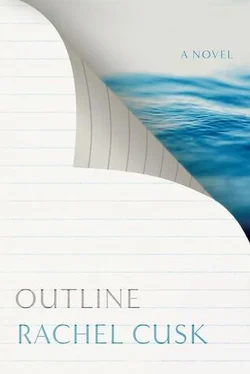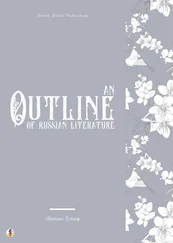The hurtling motion of the boat began to slow and the sound of the motor to die away. My neighbour asked me courteously, when I sat up, whether I had managed to switch off for a while. We were drawing close to the marina, its white boats startling against their background of blue, and beyond them the brown roadscape, desultory in the heat, all of it seeming to move unstoppably up and down in the sunshine though in fact the motion was ours. If I was hungry, my neighbour said, there was a place he knew just over there that made souvlaki. Had I eaten souvlaki before? It was very simple but could be very good. If I would just be patient while he moored the boat and went through the necessary procedures, we could be eating shortly, and afterwards he would drive me back to Athens.
In the evening I was meeting an old friend of mine, Paniotis, at a restaurant in the centre of town. He called to give me directions, and also to tell me that someone else — a woman novelist I might have heard of — would probably be joining us. She had been very insistent; he hoped I didn’t mind. She wasn’t a person he cared to offend: I’ve been in Athens too long, he said. He described the route meticulously, twice. He was being kept in a meeting, he said, otherwise he would have come to fetch me himself. He didn’t like leaving me to find my way on my own but he hoped he had made things sufficiently clear. If I counted the traffic lights as he had told me to, turning right between the sixth and the seventh, I would not go wrong.
At evening, with the sun no longer overhead, the air developed a kind of viscosity in which time seemed to stand very still and the labyrinth of the city, no longer bisected by light and shade and unstirred by the afternoon breezes, appeared suspended in a kind of dream, paused in an atmosphere of extraordinary pallor and thickness. At some point darkness fell, but otherwise the evenings were strangely without the sense of progression: it didn’t get cooler, or quieter, or emptier of people; the roar of talk and laughter came unstaunched from the glaring terraces of restaurants, the traffic was a swarming, honking river of lights, small children rode their bicycles along the pavements under the bile-coloured streetlamps. Despite the darkness it was eternal day, the pigeons still scuffling in the neon-lit squares, the kiosks open on street corners, the smell of pastry still hanging in the exhausted air around the bakeries. In Paniotis’s restaurant a fat man in a heavy tweed suit sat alone at a corner table, delicately cutting a slice of pink watermelon into small pieces with his knife and fork and placing them carefully in his mouth. I waited, looking around the dark-panelled interior with its insets of bevelled glass, where the sea of empty tables and chairs was multiply reflected. This was not, Paniotis acknowledged when he arrived, a fashionable place; Angeliki, who intended to join us presently, would certainly be displeased, but at least it was possible to talk here, and one could be sure of not meeting anyone one knew who could interrupt. I probably didn’t share his feelings — he hoped, really, that I didn’t — but he was no longer interested in socialising; in fact, increasingly he found other people positively bewildering. The interesting ones are like islands, he said: you don’t bump into them on the street or at a party, you have to know where they are and go to them by arrangement.
He asked me to stand up so that he could embrace me, and when I came out from behind the table he looked closely into my eyes. He had been trying to remember, he said, how long it was since our last encounter — did I know? It must have been more than three years ago, I said, and he nodded his head as I spoke. We had lunch in a restaurant in Earls Court, on a day that had been hot by English standards, and for some reason my children and husband had come too. We were on our way somewhere else: we stopped to meet Paniotis, who was in London for the book fair. I went away from that lunch, he said, feeling that my own life had been a failure. You seemed so happy with your family, so complete, it was an image of how things ought to be.
His body, when we hugged, felt extremely light and fragile. He was wearing a threadbare lilac-coloured shirt, and a pair of jeans that hung from him in folds. He drew back and looked at me closely again. There is something of the cartoon character about Paniotis’s face: everything about it is exaggerated, the cheeks very gaunt, the forehead very high, the eyebrows winging off like exclamation marks, the hair flying out in all directions, so that one has the curious feeling one is looking at an illustration of Paniotis rather than at Paniotis himself. Even when he is relaxed he wears the expression of someone who has just been told something extraordinary, or who has opened a door and been very surprised by what he has found behind it. His eyes, within this rictus-like expression, are very mobile and changeable and often bulge dramatically forward, as though one day they might fly out of his face altogether with astonishment at what they have witnessed.
And now, he said, I can see that something has happened, and I have to say I would not have expected it. I do not understand it at all. That day, he said, in the restaurant, I took a photograph of you with your family — do you remember? Yes, I said, I remembered. I said that I hoped he wasn’t about to show the photograph to me and he looked sombre. If you don’t wish it, he said. But of course I have brought it with me; it’s here in my briefcase. I told him that his taking a photograph was, in fact, the thing that stood out in my mind from that day. I remembered thinking that it was an unusual thing to do, or at least a thing I would not have thought to do myself. It marked some difference between him and me, in that he was observing something while I, evidently, was entirely immersed in being it. It was one of those moments, I said, that in retrospect have come to seem prophetic to me. And indeed, being so immersed, I did not notice that Paniotis went away from our encounter feeling that his life had been a failure, any more than the mountain notices the climber that loses his footing and falls down one of its ravines. Sometimes it has seemed to me that life is a series of punishments for such moments of unawareness, that one forges one’s own destiny by what one doesn’t notice or feel compassion for; that what you don’t know and don’t make the effort to understand will become the very thing you are forced into knowledge of. While I spoke Paniotis looked more and more aghast. That is a terrible notion that only a Catholic could have come up with, he said. Though I can’t say there aren’t quite a few people I would like to see punished in so delightfully cruel a fashion. Those are the ones, however, who are certain to remain unenlightened by suffering to the end of their days. They make sure of it, he said, picking up the menu and turning with a lifted finger to the waiter, an immense grey-bearded man clad in a long white apron, who all this time had been entrenched so absolutely motionless in the corner of the almost empty room that I hadn’t noticed him. He came and stood before our table with his powerful arms folded across his chest, nodding his head while Paniotis spoke rapidly to him.
That day in London, Paniotis resumed, turning back to face me, I realised that my little dream of a publishing house was destined to remain just that, a fantasy, and in fact what that realisation caused me to feel was not so much disappointment at the situation as astonishment at the fantasy itself. It seemed incredible to me that at the age of fifty-one I was still capable of producing, in all innocence, a completely unrealisable hope. The human capacity for self-delusion is apparently infinite — and if that is the case, how are we ever meant to know, except by existing in a state of absolute pessimism, that once again we are fooling ourselves? I had thought there was nothing, having lived my whole life in this tragic country, about which I could any longer deceive myself, but as you have so unhappily pointed out, it is the very thing you don’t see, the thing you take for granted, that deceives you. And how can you even know you have taken something for granted until it is no longer there?
Читать дальше












